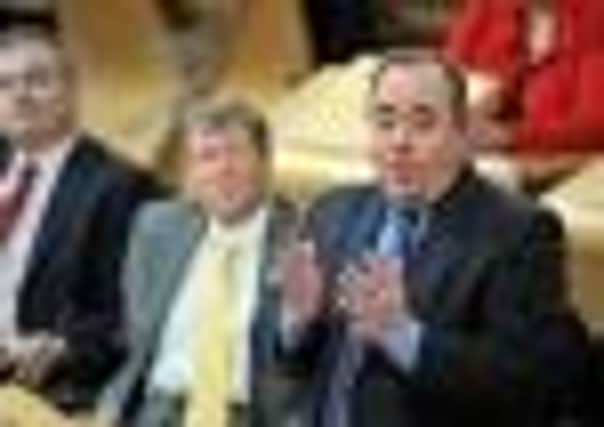Alex Salmond: reaching a consensus is in everyone’s interest


In his most conciliatory comments since naming autumn 2014 as his preferred date for the historic vote on the future of the United Kingdom, the First Minister told his unionist opponents he has every interest in reaching a consensus on the staging of a referendum on Scottish independence.
The SNP majority at Holyrood last night ensured that MSPs backed a motion calling for independence after a day of highly charged debate at the Scottish Parliament.
Advertisement
Hide AdAdvertisement
Hide AdThe motion stated that the Scottish Parliament should run the independence referendum, despite warnings that such an approach will inevitably be challenged in the courts, and also called for 16 and 17-year-olds to be allowed to vote.
It was passed by 67 votes to 56 following an impassioned debate in the Holyrood chamber and a session at First Minister’s Questions (FMQs) dominated by Scotland’s constitutional future.
The most fiery of the exchanges resulted in Labour calling for the resignation of the SNP MSP Joan McAlpine as an aide to Alex Salmond after she had suggested that pro-Union parties were “anti-Scottish”.
But amidst the controversy, there was rhetoric to suggest that Mr Salmond was prepared to reach a consensus with his opponents in order to achieve a referendum, despite the legal uncertainties of one organised from Holyrood.
Mr Salmond claimed he had “every interest in making sure we have a consensus on the process” of a referendum. “I am anxious, like I hope every other member in this chamber is, to get to the nub of the argument, to let the Scottish people decide their own future,” he added.
But in the complex game of constitutional chess that has characterised the political debate since David Cameron’s intervention at the beginning of the week, his conciliatory attitude appeared at odds with earlier comments in the debate when he refused to accept calls to open all-party talks on the timetable.
Opening the debate, which had been called by her party, the Labour leader Johann Lamont taunted Mr Salmond arguing that far from pressing ahead with an independence poll, Mr Salmond was shying away from it.
The pro-Union parties have argued that the referendum should be held sooner rather than later, while the SNP intend to hold it in autumn 2014.
Advertisement
Hide AdAdvertisement
Hide AdMs Lamont said: “He has a mandate, he has a majority, surely it cannot be he does not have the courage to face the verdict of the Scottish people?
“He says independence will be the cure of all Scotland’s ills. The economy will be transformed by what his spin doctors say are job-creating powers. His finance minister says we’ll be the sixth richest nation on earth. Scotland will be free and proud.
“He is Moses who has led his people to the brink of the promised land but, as they view it from the mountain tops, says to them, ‘let’s camp outside for a few more years before we go in’.”
There were yet more warnings of a Holyrood organised referendum facing a challenge in the courts as the Scotland Act dictates that Westminster has control over such polls. The pro-Union side continued to argue for a so-called Section 30 order that would transfer the power over such a poll from Westminster to Holyrood.
The Scottish Liberal Democrats leader Willie Rennie referred to the US elections of 2000 which saw a dispute over recounting in Florida eventually settled in the US Supreme Court.
He said: “We’ve been fortunate in the United Kingdom that legal challenges to elections have not dominated the political process.
“But that could all change. The problem we face is not the specific type of referendum – advisory or binding – that matters, it is the substance of the question being posed that counts. Constitutional matters are reserved to Westminster, even though the mandate is here.”
Later at FMQs, Mr Salmond repeated his objections to the coalition government’s offer of a Section 30 order that would not extend the vote to 16 and 17-year-olds and which could also impose a time limit.
Advertisement
Hide AdAdvertisement
Hide AdMr Salmond said that while there was no difficulty with the use of the “Section 30” to grant the powers to the Scottish Parliament, this should not come with “strings attached”.
In her exchange with the First Minister, Ms Lamont made another plea for consensus on the referendum. Mr Salmond, she said, “must understand that he must dispel the perception that he is acting in the interests of the SNP and not of Scotland”.
The Conservative leader Ruth Davidson objected to Mr Salmond’s insistence that the Electoral Commission should not be allowed to run the poll.
She said: “Why doesn’t he trust the Electoral Commission now? His accusations leave serious doubts about whether he wants a legal, fair and decisive referendum.”